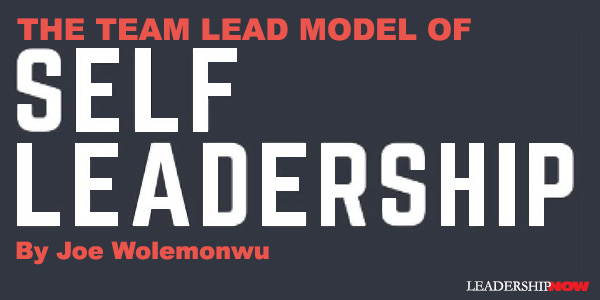 |
 |
09.13.22

The Team Lead Model of Self-Leadership
EVERY organization needs leadership. Whether you work in small enterprising entrepreneurship or a Fortune 500 conglomerate, sound leadership is required for progress. Experts will agree that effective leaders must have superior qualities, skills, and talents that influence the workforce to complete the organization’s mission efficiently and effectively. Regardless of the organization’s vision and mission statement, leadership is a fundamental requirement. The TEAM LEAD Model of Self Leadership by Joe Wolemonwu offers an eight-step model that gives every leader the tools to move their agency forward.
T.E.A.M. L.E.A.D. is an acronym for Training, Enterprising, Authenticity, Mindfulness, Listening, Empathizing, Accountability, Delegation. This model identifies eight leadership requirements, accomplishments, and skills a leader must have to be effective. In essence, this model offers a quicker rate of acceleration in all quadrants of the organization by the consistency of the leader’s conviction and commitment to excellence. A leader must possess all of the eight core T.E.A.M. L.E.A.D. attributes to be more effective. The Team Lead concept is a self-leadership approach to leading a team. Four attributes with the acronym T.E.A.M. and internal attributes the leader must possess, while the remaining four L.E.A.D. show external attributes that enable the leader to lead the team effectively. Training enhances performance, grows knowledge, makes a leader Competent, and boots productivity through learned skills. Enterprising develops a leader’s capacity to generate ideas and skills that make them creatively Resourceful. A resourceful leader always finds a way to take advantage of a situation. Authenticity gives a leader Credibility and makes people appreciate your leadership. Mindfulness creates Resilience and happiness and increases productivity. It helps regulate your emotions. It enables you to have a greater level of emotional intelligence. The second part begins with Listening. Listening helps a leader Communicate effectively and makes them more charismatic by keeping them engaged and makes them more charismatic by keeping them engaged in a conversation. It helps improve the leader’s relationships with others. Empathizing with others helps build Trust and encourages open communication and effective feedback. Accountability helps to improve Performance and enables people to be in control of their actions. Delegation helps promote Teamwork by creating a mentorship environment that supports learning and development with credible skills to grow and work effectively as a team. T.E.A.M. L.E.A.D. focuses on growing the leader internally first and having those qualities exhibited and passed on to the entire organization as a fundamental recipe for success and progress. As organizations are constantly evolving and transforming as it progresses, the same applies to the leader, who must acquire new knowledge to remain relevant and effective in leading the organization. When an organization stagnates, it dies, consequently failing to produce the goals of its mission. A leader must also intellectually grow while constantly adopting some personal attributes and skills which accentuate goodness and effective leadership. The most common measurement of a leader’s effectiveness is assessing group performance and the scope to which the goals and objectives of the group are met. The degree to which this can be measured is a strong indicator that leaders can influence their subordinates and lead them to achieve the organization’s strategic objectives. The questions that should be asked to measure a leader’s competency in accountability, for example, are as follows:
The TEAM LEAD Model of Self-Leadership serves as both a workbook and reference manual. Again, the book shares a reflection leadership concept that most leaders overlook. Reflective practice accelerates improvement in your leadership skills and enables you to better understand yourself and others. Leadership reflection makes a leader gain a better understanding of themselves (value principles, knowledge, ability, and skills), learn from past experiences, and adapt and respond to new leadership challenges. The Team Lead Model of Self-Leadership is simple to apply but requires a commitment from you to grow yourself. If leaders want to bring out the best in their team, they must first bring out the best in themselves.  
Posted by Michael McKinney at 08:53 AM
|
BUILD YOUR KNOWLEDGE
 

How to Do Your Start-Up Right STRAIGHT TALK FOR START-UPS 
Grow Your Leadership Skills NEW AND UPCOMING LEADERSHIP BOOKS 
Leadership Minute BITE-SIZE CONCEPTS YOU CAN CHEW ON 
Classic Leadership Books BOOKS TO READ BEFORE YOU LEAD |